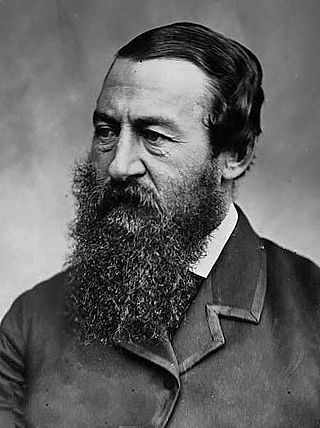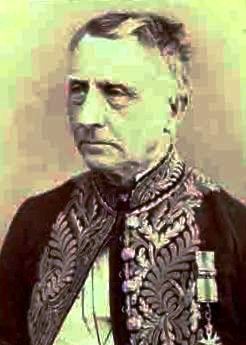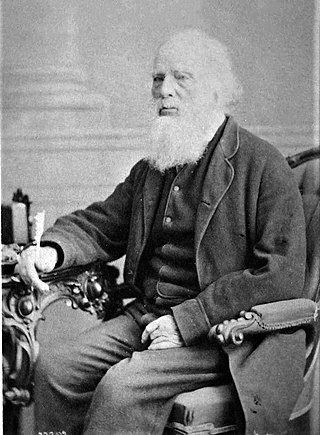Related Research Articles

Andrew Geddes Bain, was a Cape Colony geologist, road engineer, palaeontologist and explorer.

Sir Samuel White Baker was an English explorer, officer, naturalist, big game hunter, engineer, writer and abolitionist. He also held the titles of Pasha and Major-General in the Ottoman Empire and Egypt. He served as the Governor-General of the Equatorial Nile Basin between April 1869 and August 1873, which he established as the Province of Equatoria. He is mostly remembered as the first European to visit Lake Albert, as an explorer of the Nile and interior of central Africa, and for his exploits as a big game hunter in Asia, Africa, Europe and North America. Baker wrote a considerable number of books and published articles. He was a friend of King Edward VII, who as Prince of Wales, visited Baker with Queen Alexandra in Egypt. Other friendships were with explorers Henry Morton Stanley, Roderick Murchison, John H. Speke and James A. Grant, with the ruler of Egypt Pasha Ismail The Magnificent, Major-General Charles George Gordon and Maharaja Duleep Singh.

The Great Trek was a northward migration of Dutch-speaking settlers who travelled by wagon trains from the Cape Colony into the interior of modern South Africa from 1836 onwards, seeking to live beyond the Cape's British colonial administration. The Great Trek resulted from the culmination of tensions between rural descendants of the Cape's original European settlers, known collectively as Boers, and the British. It was also reflective of an increasingly common trend among individual Boer communities to pursue an isolationist and semi-nomadic lifestyle away from the developing administrative complexities in Cape Town. Boers who took part in the Great Trek identified themselves as voortrekkers, meaning "pioneers" or "pathfinders" in Dutch and Afrikaans.

Sir Andrew Smith was a British surgeon, explorer, ethnologist and zoologist. He is considered the father of zoology in South Africa having described many species across a wide range of groups in his major work, Illustrations of the Zoology of South Africa.
The following lists events that happened during 1864 in South Africa.
The following lists events that happened during 1817 in South Africa.

The 1820 Settlers were several groups of British colonists from England, Ireland, Scotland, and Wales, settled by the government of the United Kingdom and the Cape Colony authorities in the Eastern Cape of South Africa in 1820.
Colonel John Graham was a British soldier and administrator best known for founding the settlement of Grahamstown in the Cape Colony in 1812. Grahamstown went on to become a military, administrative, judicial and educational centre for its surrounding region.
Frederick Thomas (Fred) Green was an explorer, hunter and trader in what is now Namibia and Botswana. From 1850 to 1853 he operated in the Lake Ngami area with his older brother Charles. After 1854 he was mainly based in Damaraland (Namibia).

Charles Davidson Bell FRSE was a Scottish-born artist who spent the majority of his life in the Cape Colony. In addition to serving as the Surveyor-General of the colony, he was also a heraldist who designed several of the Cape Colony's medals and stamps.

Major Sir William Cornwallis Harris was an English military engineer, artist and hunter.
David Hume (1711–1776) was a Scottish philosopher, economist, and historian.
Moodie is a surname. Notable people with the surname include:

Sir Richard Southey was a British colonial administrator, cabinet minister and landowner in South Africa.
Hume is a Scottish surname that derives from Hume Castle, Berwickshire, and its adjacent estates. The name may refer to:

John Burnet Biddulph was a Cape Colony explorer and trader who arrived with the 1820 Settlers.

Hon.James Cotterell Hoole MLC was a prominent member of the Legislative Council of the Cape Colony.

William Arthur Hume was a prominent politician of the Cape Colony and the Member for Port Elizabeth in the Cape Parliament.

John Wedderburn Dunbar Moodie was a Scottish-born army officer, farmer, civil servant and writer in early Canada.

Captain Benjamin Moodie was the 10th Laird of Melsetter who led a party of 200 Scottish immigrants to the Cape Colony in 1817, three years before the arrival of the 1820 Settlers.
References
- ↑ "David Hume (66), explorer and big-game hunter, dies in Grahamstown. He came to the Cape with Benjamin Moodie's Scotch settlers". South African History Online. 31 January 2012. Archived from the original on 6 June 2017. Retrieved 8 October 2016.
- Standard Encyclopaedia of Southern Africa. Vol. 5. Cape Town: Nasou. 1972. p. 467. ISBN 0-625-00321-7.